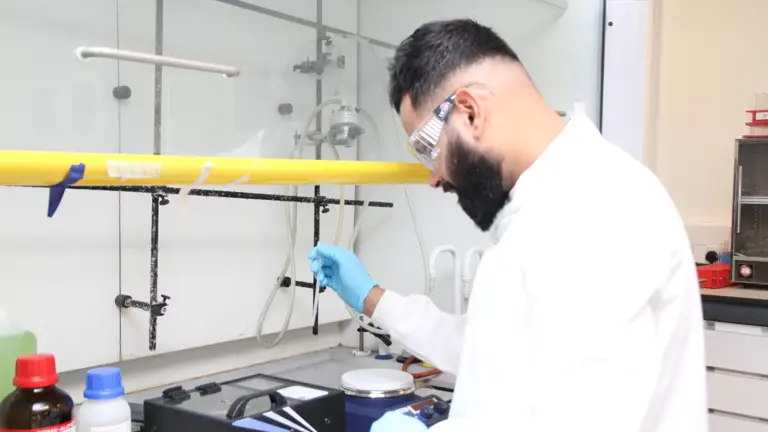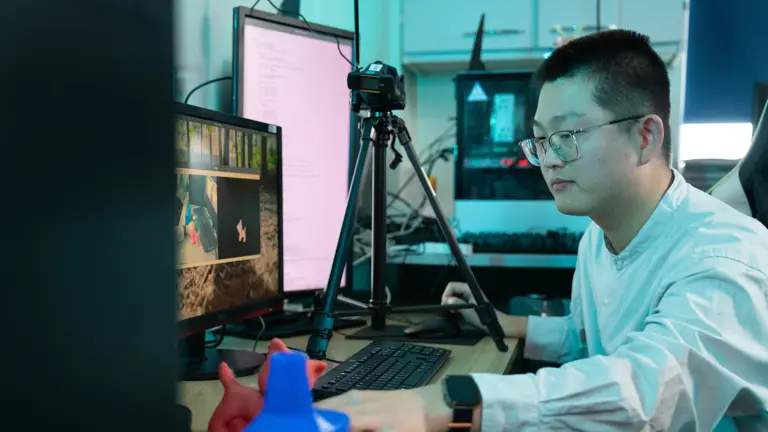Postgraduate research
Study a research degree with us and you’ll join a vibrant and world-class research environment. Get in touch with a research tutor to explore your options.

Explore our research courses
A PhD will allow you to study your chosen research topic in-depth. You'll build on your existing knowledge and develop valuable transferable skills.
We're here to support you during your studies. You’ll receive regular supervision and training to help you succeed in your independent study. In some cases, you can undertake periods of fieldwork in the UK or overseas.
We offer alternative start dates for your research degree, starting in September, January or March.
What's the right research degree for you?

Types of research degrees
We offer a range of postgraduate research options to suit researchers at all levels. Read our guide to postgraduate research degrees and choose the research degree that's right for you.
Frequently asked questions
Undertaking a research degree is a large commitment. Before starting your studies, you should consider some things:
- You will need to attend university regularly to study, for supervision, training and research symposia.
- Your subject area and study mode will determine the amount of time you need to spend studying on campus
- Normally you are expected to be resident in the UK and within daily travelling distance of the University.
- Some programmes will include periods of fieldwork away from the University either in the UK or abroad
Research degrees differ from other types of courses. The end date depends on you submitting a thesis and the outcome of the viva voce examination. The expected timelines for each award are below:
Scroll or swipe on small screens to see all table columns
| Award | Expected timeframe to submit your thesis | Max time allowed for submission of thesis |
|---|---|---|
| MA/MSc/LLM (by research) | 12 months | 24 months |
| MPhil | 24 months | 36 Months |
| PhD (via transfer from MPhil registration) | 36 months | 48 months |
| PhD direct | 24 months | 36 months |
Scroll or swipe on small screens to see all table columns
|
Award |
Expected timeframe to submit your thesis | Max time allowed for submission of thesis |
|---|---|---|
| MA/MSc/LLM (by research) | 24 months | 36 months |
| MPhil | 48 months | 60 months |
| PhD (via transfer from MPhil registration) | 72 months | 84 months |
| PhD direct | 48 months | 60 months |
| MD (Res) and MCh (Res) | 36 months | 48 months |
| PhD (by published work) | 12 months | 24 months |
| PhD (by portfolio) | 48 months | 60 months |
Time for examination to be completed and the award to be conferred
The timescales vary depending on the result of the examination. The minimum time is around three months. Most students average around six months.
Our Graduate Research School supports the postgraduate research environment and culture. The school delivers training, as well as hosts events and activities.
- We offer research skills training that is mapped to the Vitae Researcher Development Framework
- We host the 3MT (Three Minute Thesis) competition and Annual PGR Conference
- We support the postgraduate research (PGR) Society
- We manage the UCLan Undergraduate Research Internship Programme (UURIP)
- We represent the PGR community at University level
- We support research supervisors, research degree tutors and examining teams
- We listen and respond to the PGR student voice
Studying for a research degree01 / 04
PhD student Elisa tells us about her experience as a research student
Alumni Loyalty Discount
If you're a UK student with a previous award from us you may be eligible to receive 20% tuition fee discount.
Research degree tutors
Before you apply or submit your own proposal it’s a good idea to explore your ideas with one of our research degree tutors. Email us and we'll put you in contact with the relevant tutor. Or email one of the research degree tutors directly, using the details below.
Accounting and Finance/Economics/Business/Marketing
Operations Management/Logistics & Supply Chain Management/Human Resource Management/Tourism and Hospitality
Professional Doctorate (DBA) Enquiries
Astrophysics/Physics/Mathematics
Building Services/Fire Engineering
Construction Management/Facilities Management/Procurement/Economics
Electrical Engineering/Digital Signal and Image Processing
Electronics/Mechatronics/Tribotronics
Energy and Environment
Human Computer Interaction/Computing
Mechanical Engineering/Simulation/Oil and Gas (and Senior RDT)
Social Policy/Social Work/Professional Doctorate enquiries
Gender-based Violence/Ethnic minorities/Social Policy
RDT and Course Leader for Professional Doctorate (DProf) Professional Practice Community & Social Care: Policy & Practice enquiries
Applied Health
Applied Health/Biomechanics
Sport and Cultural Studies
Sport and Exercise Sciences
Sport and Exercise/Food Nutritional Sciences
Sport Business/Sports Coaching
Sport Studies/PE/Outdoors
Institute of Coaching and Performance
Professional Doctorate in Elite Performance (DProf) enquiries
Professional Doctorate (DProf) in Psychotherapy
School Lead for PhDs (including all research degree awards)
Archaeology and Forensic Science
Criminology and Policing
Law
Professional Doctorate in Criminal Justice (DProf) enquiries
Dentistry
Medicine
Professional Doctorate (DProf) in Clinical Studies enquiries
Applied Chemistry/Material Science
Pharmacy and Biomedical Sciences
Cognitive and Affective/Psychology/Cognitive Neuroscience/Psychobiology/Social Psychology/Health Psychology
Forensic Psychology
Humanities, Language & Global Studies and the Doctorate in Education (EdD)
- Nick Palfreyman (Lead RDT for Humanities)
Health Visiting/Midwifery
Nursing/Philosophy/Mental Health
Professional Doctorate in Health (DProf) enquiries
Veterinary Medicine
Research and Knowledge Exchange institutes
Discover our range of University research areas to tailor your degree towards. Our Research and Knowledge Exchange institutes enhance the quality of our research environment and create more opportunities to achieve world-leading impact through their activities.
How to apply
Research of national and international excellence is at the heart of academic life at the University of Central Lancashire. On completion of your research degree you should be in a very strong position for pursuing your chosen career. If you're ready to start your research degree, you'll find details of the application process on the next few pages.
Fees, costs and funding
It is important that you know how you are going to fund your studies for the duration of your research degree, and ensure you have the resources to pay all your fees, costs associated with your research programme and your living expenses.
Studentships
Most studentship funding is for PhD places. Schemes vary and may provide either full cover or partial funding for tuition fees, and some may also include a maintenance grant. Please check individual awards for eligibility.
Current research students are not eligible to apply for our research studentships.
Hear from our PhD students
Udit Tiwari talks about his PhD and University experience
 Udit Tiwari - PhD, Physics
Udit Tiwari - PhD, Physics
PhD student Jianyu Zhao shares his experience
 Jianyu Zhao - PhD, Engineering
Jianyu Zhao - PhD, Engineering
Elisa Pierella talks about her experience studying for a PhD
 Elisa Pierella - PhD, Microbiology
Elisa Pierella - PhD, Microbiology
I never expected my MRes to open so many prospects for me, from the networks I have built, the skills I have obtained and the opportunities that allowed me to try new things.

I am blessed with amazing supervisors that I can turn to whenever I need anything, which definitely constitutes having a positive productive time here at UCLan.

Postgraduate research student profiles
Showcasing a breadth of current research projects from our postgraduate students.
